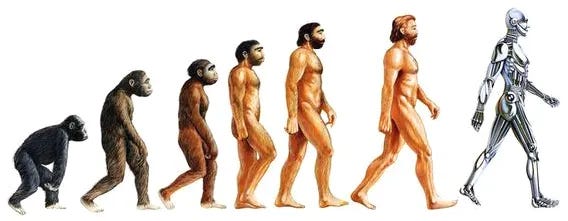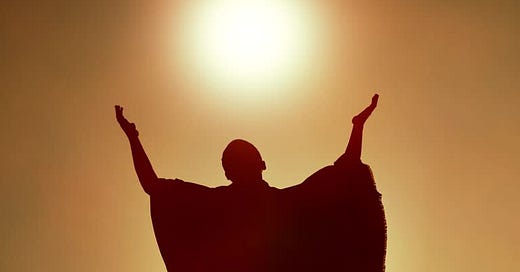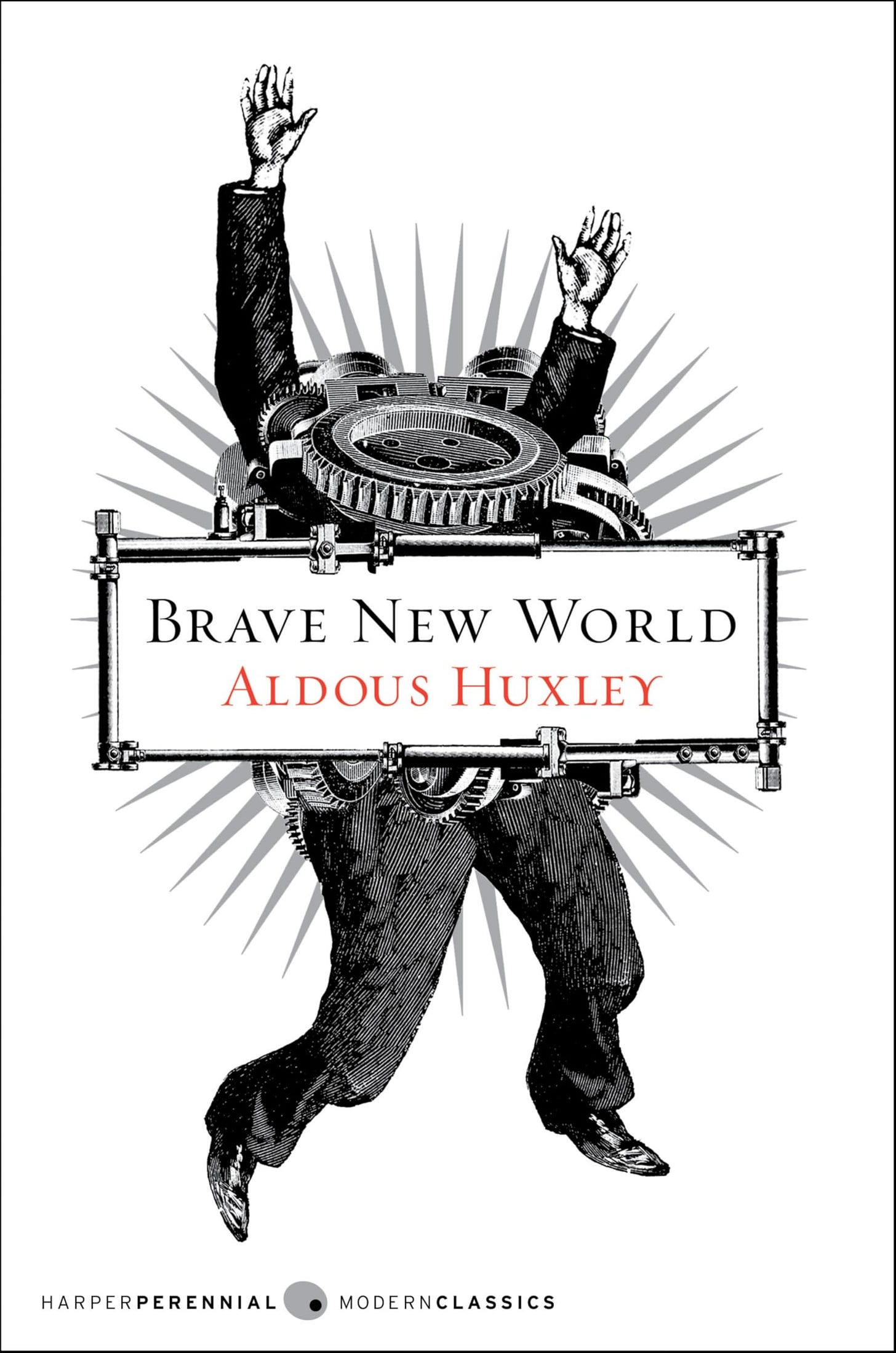Industrialized Gods: The Synthesized Spiritualities of Brave New World and Klara and the Sun
As technology continues to exceed our human limitations, what is left of the soul and divinity? Join me as I explore the mechanization of religion in Brave New World and Klara and the Sun
“We are not human beings having a spiritual experience.
We are spiritual beings having a human experience.”
Pierre Teilhard de Chardin
I begin my inquiry with a quote from French philosopher Pierre Teilhard de Chardin because his words beg the question of what it means to be human; That is, what it means to be a spiritually enlightened and connected human. Over thousands of years, there has been an indescribable amount of discourse on the question of human spiritual relevancy; the joint ontological crisis has united humanity in the search for meaning. With the constant evolution of astonishing technology, the pursuit of meaning in the eyes of spirituality seems descendingly out of reach. What is there to come forth in the absence of spirituality for the sake of technology? Aldous Huxley’s dystopian novel Brave New World (1932) envisions a World State of shallow and brainwashed humans who worship Henry Ford, the father of automation. Kazuo Ishiguro’s Klara and the Sun (2021) depicts an artificial friend robot who idolizes the Sun and prays for nourishment to her solar-powered battery pack. Both novels contain unique portrayals of industrialized religions in an attempt to imitate humanness in otherwise posthuman characters. In this paper, I will examine the synthesized spiritualities of Bernard and Klara and how spirituality helps them become more human by experiencing natural emotions that go against their “unnatural” design.
To bolster my argument, I will analyze each novel based on three aspects of religion: Perception, Connection, and Reception. First, how is the divine being perceived? Second, how is the divine being worshiped, and how does this worship connect them to their mechanized gods? Lastly, how is the worshiper changed through this perception and connection? Furthermore, I will examine each novel’s theology based on the complexity of the communion with a deity, the conception of an afterlife, and, ultimately, how these factors affect the protagonists. I will argue the validity and importance of spiritual experiences in posthuman bodies by applying a posthumanist reading.

Perception
In the eyes of Mustapha Mond, his Fordliness and Controller of the World State in Brave New World, the search for what it means to be human leads men to “renounce, retire, take to religion, spend their time reading, thinking-- thinking!” (Huxley 55). The liberty and freedom of thinking led to the Nine Years' War in A.F. 141, an event the World State would prefer to leave in the past. Huxley’s dystopian future set in 632 A.F. predicts a world in which thinking is discouraged and biologically regressed to create a brainless and unnatural consumer society. In Huxley’s supposed utopia, biological engineering has created the perfect race, free from aging, the fear of death, and loneliness. Worldlings have become virtually unrecognizable from their more human ancestors. New cloning technologies allow for the mass reproduction of bottle babies, genetically separated into caste systems during embryonic development. A single drug called soma is responsible for all happiness and psychological manipulation of the masses. The World State is a civilization in which no one is alone, everyone belongs to everyone else, and ignorance is the most valuable characteristic of a good citizen.
In a world so heavily influenced by technological advancement, it is no surprise that the Worldlings would worship Henry Ford, creator of the assembly line and the Model T. Ford manifests as “The Greater Being” and the architect of the World State’s industrialized design. He fills in the role of a traditional deity, receiving worship, offerings, and religious ceremonies that, through mass orgies, connect everyone to everyone else. The Worldlings even begin life on an assembly line, forever owing their unnatural existence to Ford’s proudest creation. Fordism appears to have complex construction and a practiced set of doctrines, such as “cleanliness is next to Fordliness” and crossing a T over one’s stomach as a sign of worship, referring back to Ford’s famous invention (Huxley 110). Despite these doctrines' evident roots in Christianity, any mention of the old “God” is met with either indignation or confusion. In this future, “God is in the safe and Ford is on the shelves” (Huxley 234), and the remnants of the Abrahamic religion are ironically only maintained in Indian Reservations as a blended form of native religion. As a god, Ford also takes the form of three separately named beings: Our Ford (or Our Freud in some cases), The Voice, and The Greater Being, similar to the Christian doctrine of the Trinity.
With the removal of the Christian God, Huxley’s world has evolved outside of the realm of nature and delved deeper into a more complex world of human invention, where the Wordlings imitate god in everything, from staving off death through unnatural, advanced medical cures, to splitting a single zygote into over 100 individuals, all made from the same DNA (Huxley 13). Genetic engineering allows for the predestination of social caste, similar to the predestination of a soul, whether to Heaven or Hell, present in Calvinism. Alphas, Betas, and Epsilons are among the castes mentioned, with Alphas making up the pinnacle of biological evolution and Betas falling just behind. Epsilons, however, are given alcohol infusions while in the womb to create a lower, uneducated caste expected to serve the Alphas and Epsilons. Huxley’s mock predestination myth stems from Plato’s use of the myth of three metals: gold for the Alpha, silver for Beta, and bronze for the Epsilon. The separation and ranking of citizens ironically goes against the “everyone is connected” notion and serves as a testament to the industrialization of a massive consumerist society, where the rich (Alphas) will still conquer the poor (Epsilons) (Hoffecker 49).
Spirituality is still very much present in Brave New World, only in an industrialized perception. In the absence of god, something else must satiate the Worldlings' need for religious emotion, which comes from another disembodied authority. As coined by Huxley’s brother, Julian Huxley, religious emotion refers to the biological need for religion as a drive in humanity, a drive that, if effectively controlled, could be used to manipulate vulnerable masses (Congdon 85). The World State would not miss this opportunity to enforce religious control as a means to maintain tyrannical stability. Ford as the Voice speaks to citizens as the Voice of Good Feeling or the Voice of Reason, all of which are sound currents produced by a Synthetic Music Box controlled by the men in positions of authority, such as Mustapha Mond (Huxley 214-215). Putting the body of god into a manufactured machine automatically industrializes the supposed divine being. Worldlings are also “death-conditioned,” which removes the fear of death and, effectively, removes the need for a god or an afterlife (Huxley 203). As people are “never alone now,” there is no time to reflect on one’s life or death in the dark loneliness of night (Huxley 235). “Phosphorus recovery” is introduced as an industrialized afterlife for the Worldlings to further this divine synthesis. In the World State, solitude cannot be found even in death as bodies are discarded in mass via Crematoriums and returned to the earth to be “socially useful… Making plants grow… Going up in a squirt of hot gas… whoever he may have been, he was happy when he was alive. Everybody’s happy now” (Huxley 73-75 in passim). In this afterlife, Worldlings feel secure, understanding that they will continue “being social” and giving back to the community they leave behind. Thus, this belief encourages them to continue being useful throughout their remaining days. Through the manipulation of a moralizing godhead, the World State maintains complete control over citizens, enhanced further by “orgie-porgy” religious ceremonies, soma, and biological manipulation.
Kazuo Ishiguro’s Klara and the Sun also features a world heavily impacted by progressive industrialization, with far fewer societal extremes than Brave New World. However, both novels share the same motif of genetic manipulation. He tells the story of Klara, an Artificial Friend (or an AF) who is assigned to accompany Josie, a genetically manipulated “lifted” child with severe health problems. As a robot, Klara is exceptionally gifted at observation and reasoning to the point of being fearsomely advanced in appearing human. Because of her humanness, Josie’s mother purchases Klara but secretly plans to program the AF to resemble her daughter in appearance and personality upon her impending death. During her journey as Josie’s friend, Klara grows in her connection to the Sun, whom she prays to hopefully avoid this tragic circumstance. When she sacrifices a part of herself to destroy the Pollution of the Cootings Machine, the Sun’s enemy, she understands the meaning of love. She saves Josie before resigning herself to a junkyard in her outdated use.
Historically, worship of the sun is traceable as far back as Utu, a Mesopotamian sun god. Between Ra, Helios, Sol, and many other solar deities, veneration of the sun is not unique to any singular culture and is a primitive human ideology. Worship of the sun stems from its representation as the nourisher of life and the bringer of warmth. For Klara, however, sun worship is a highly human connection to a natural divine being, yet her specific worship stems from an unnatural and man-made function. The sun is Klara’s source of nourishment, and she uses it for solar power to energize her entire mechanical design. Her worship of the sun stems from a human sense of reasoning. The sun is the source of nourishment and, thus, the maker of her existence.
Her artificial function, however, shows in her understanding of time and death, two considerably human conceptions. To Klara, the sun manifests as an ever-present, overlooking divine being, with time and death under his control. His presence in the sky indicates the height of his power, a human approach to conceptualizing time by solar placement and fading daylight. Klara feels absent and disconnected from her god whenever he “fades out” of the sky to wherever he goes for rest. She explicitly notes his absence in the event of a cloudy and miserable day (Ishiguro 100). One night, Klara believed that a Beggar Man, whom she had watched from her shop window, had died but miraculously came back to life by “hungrily absorbing the Sun’s special nourishment” (Ishiguro 38). In reality, the Beggar and his dog had simply woken up from a prolonged sleep, but Klara’s programming forced her to believe it was the energy of her god. She would repeat this belief when Josie is finally healed by the supposed power of the Sun, even though Josie suffered pale skin, fatigue, and muscle weakness, all signs of a severe Vitamin D deficiency.
Like Brave New World, Ishiguro utilizes an industrialized afterlife as an aspect of Klara’s synthetic spirituality. When Klara completes her purpose as Josie’s Artificial Friend, she retires to a junkyard where she spends her days “able to watch the Sun’s journey unimpeded, and even on cloudy days, (she) is always aware of where he is above (her)” (Ishiguro 298). Much earlier in the novel, Klara receives a premonition of this afterlife when she hears the cries of an animal and sees an image of AF Rosa, an old friend, “sitting on the rough ground somewhere outdoors, little pieces of metal scattered around her” (Ishiguro 155). While resting in the junkyard, Klara’s old Manager greets her. In an ethereal momentary exchange, the Manager is the last individual Klara sees on her observable journey, echoing when Klara was, assumedly, put together and metaphorically brought into the world by the Manager. Wrapping up loose ends with her past and once again testifying the power of the Sun, Klara finally finds peace and possible reuse in the junkyard, a place where machines go to die (Ishiguro 303).
Connection
Community, identity, and stability are the most important factors of the World State; Citizens must follow the flow of society and the rules of interaction. No one is alone, as loneliness breeds insurrection, so the worship of a higher being revolves around the values they hold dear to their society: everyone is connected. Even if it is through sex, they will find a way to connect to everyone else. Huxley introduces us to Solidarity Services and the many disturbing hymns of Fordism during this sexual ceremony. Orgies are so rampant that there are seven thousand rooms held for these Solidarity Services, and each citizen seems required to attend once every other week (Huxley 78).
As part of their communal worship, twelve Worldlings engage in a drug-induced orgy to receive their “connection” to Ford and to satiate their need for religious emotion. Furthermore, the Worldlings remain complicit in their sexualized dogma because of the use of soma, the happiness drug which is served as a type of communion at the beginning of the Solidarity Service as each participant “drinks to their annihilation” (Huxley 81). Soma not only encourages their sexual appetites but also makes them believe a voice box produces the Voice of god as they engage in frenzied sexplay to “make twelve bodies one” until the Greater Being is “crooning and cooing” when he “comes” (Huxley 85). Equating religion with a biological function and employing sex as a way to satiate this function purposefully sexualizes the religion and makes citizens believe the only way they will feel connected to their god is by having communal sex and becoming connected.
The Worldlings effectively remove pain through soma as part of their spiritual ideology. Many religions practice the importance of pain, sacrifice, and wavering faith as a way further to connect oneself to the power of a god, one who might remove them from this pain or at least teach them to grow from suffering. Instead, the World State believes civilized people should never suffer the hardship of emotions, so soma is created to counteract everything it means to be human. Instead, the infantilization of emotions leads to an ignorant and complicit society, one easier to control through the guise of an industrialized god. As soma is “Christianity without tears” (Huxley 238), the drug removes any further desire for knowledge of other spiritualities as well as the human affinity for loneliness, which often leads one to seek out god in the first place.
In Klara and the Sun, there is a deeper connection between Klara and the sophisticated humanness of her spirituality. Despite being a robot, Klara can grasp the complexity of “good” and “evil” by seeing the light of the Sun. Whenever the Sun is absent or specifically diluted by pollution, Klara notes it in her narrative. These dark days are ones in which Klara feels disconnected from her faith, and “it was a discouraging thought that the Sun was about to descend not into the place (she) was making such an effort to reach, but somewhere further away still” (Ishiguro 158). Klara’s constant need to feel the Sun near her makes her exceedingly aware of his absence, which directly leads to the presence of evil. By introducing evil forces, Klara further complicates her spirituality with her perception of evil through the bull and Pollution.
Klara specifically mentions the worst characteristics of the frightening bull, “Its face, its horns, its cold eyes watching me all brought fear into my mind, but I felt something more, something strange and deeper. At that moment, it felt to me some great error had been made that the creature should be allowed to stand in the Sun’s pattern at all, that this bull belonged somewhere deep in the ground far within the mud and darkness and its presence on the grass could only have awful consequences” (Ishiguro 100). A world “far within the mud” existing specifically in the absence of god alludes to the realm of Hell, a further complication to Klara’s spirituality. In order to stay connected to her god, she must eliminate evil, so she decides to destroy the root of evil in her world. Pollution, purposefully capitalized like the Sun in her world or The Devil in the Holy Bible comes from The Cootings Machine, which Klara observed through the shop window while she was still on sale. When Klara first prays to the Sun about helping Josie’s illness, it appears she only gets worse. Through her spiritual rationalization, Klara assumes the Sun will not help her because “The Cootings Machine had been making its awful Pollution, obliging even the Sun to retreat for a time, and it had been during the fresh new era after the dreadful machine had gone away that the Sun, relieved and full of happiness, had given his special help” (Ishiguro 117). Without removing Pollution and destroying Klara’s evil, she believes the exceptional nourishment of her god will not return. So, in order to destroy the machine, she sacrifices a part of her ‘soul’ in the form of mechanical fluid. This spiritual battle between good and evil, in which she must give something of herself to receive, proves her divine love for the Sun and deepens her connection with him.
Reception
Through the perception of an industrialized divine and a synthetic spiritual connection, which imitates a human connection, both characters receive intense changes to their now spiritualized posthuman bodies. Through the reception of spirituality, Bernard and Klara subsequently change because of their ability to experience emotions beyond their realm of understanding.
For Bernard, these natural emotions come in the form of loneliness. In a society where solitude is frowned upon, Bernard’s loneliness labels him as an outsider to his peers, yet this pivotal flaw makes him more human. He experiences natural emotions outside his cognitive construction, even while under the influence of soma, because of his distinct lack of connection to the Greater Being. Instead of feeling connected to twelve bodies and a higher power, “he was as miserably isolated now as he had been when the service began-- more isolated by reason of his unreplenished emptiness, his dead satiety. Separate and unatoned, while the others were being fused into the Greater Being; alone… much more alone, indeed, more hopelessly himself than he had ever been in his life before” (Huxley 86). Fordism does not satiate Bernard’s religious emotions; thus, he feels unfulfilled. Despite the flaws of his conditioning that allow him to experience more emotions than his peers, The Greater Being’s absence in his mind imbues him with loneliness, which guides him toward a more independent and natural life isolated from the World State on a solitary island.
Despite her sacrifice, Klara realizes it is not the destruction of evil that empowers the Sun but simply the acknowledgment of the love provided by him. As Klara communes with her god in a barn overlooking a sunset, she has only minutes left to speak with him and secures a final prayer for Josie, whose health is rapidly failing by the novel's end. Not only does she recognize her human capacity for love in these final moments, but she can also recognize the love between Josie and her best friend, Rick. By recognizing the love between others and herself, Klara sends one final prayer to the Sun, hoping Josie will get better. Her prayer proves the powerful connection between Klara and her deity and the complexity of human emotions she was never designed to comprehend fully. Though AFs are designed to be companions, there is never any mention of AFs who can genuinely love their owner. However, Klara echoes the Sun’s sacrifices of heat and light for humanity when she sacrifices a part of herself to save Josie. Following his image or the reception of his wisdom, Klara becomes human through her ability to love Josie and the Sun.
Brave New World and Klara and the Sun no doubt raise the question of what it means to be human and have a soul. Through their propensity to love and seek solitude in either the presence or absence of divinity, Klara and Bernard both connect with their more profound realm of understanding in the face of their complex spiritualities. The industrialization of religion in both novels speaks to the future of spirituality and what it means to be a spiritually connected being in worlds with overwhelming technological connections. Through their Perception, Connection, and Reception of industrialized gods, Bernard and Klara grow in their capacity to become human, even in their posthuman existence. Both novels testify to the evolution of technology and the conflicted relationship between natural divine connection and unnatural technological advances.
Works Cited
Birnbaum, Milton. “Aldous Huxley’s Quest for Values: A Study in Religious Syncretism.” Comparative Literature Studies, vol. 3, no. 2, 1966, pp. 169–82. JSTOR
Buchanan, Brad. "Oedipus in Dystopia: Freud and Lawrence in Aldous Huxley's Brave New World." Journal of Modern Literature, vol. 25 no. 3, 2002, p. 75–89. Project MUSE
Congdon, Brad. "Community, Identity, Stability”: The Scientific Society and the Future of Religion in Aldous Huxley’s Brave New World." ESC: English Studies in Canada, vol. 37 no. 3, 2011, p. 83–105. Project MUSE
Hoffecker, W. Andrew. “A Reading of ‘Brave New World’: Dystopianism in Historical Perspective” Christianity and Literature, vol. 29, no. 2, 1980, pp. 46–62. JSTOR
Huxley, Aldous. Brave New World. 11th ed., Vintage, 2010.
Ishiguro, Kazuo. Klara and the Sun. Faber 2021.







